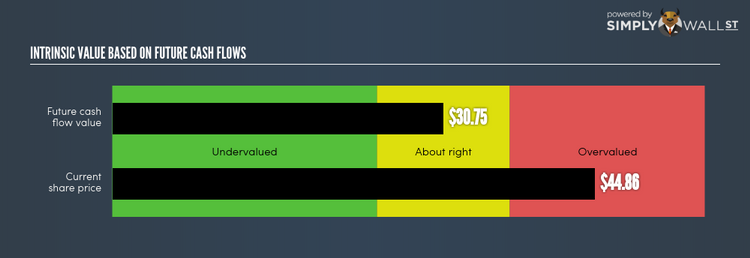Is Cohen & Steers Inc (NYSE:CNS) Expensive For A Reason? A Look At The Intrinsic Value

Pricing CNS, a financial stock, can be difficult since these capital market businesses have cash flows that are affected by regulations that are not imposed upon other sectors. Asset managers, for example, must hold certain levels of capital in order to maintain a safe cash cushion. Emphasizing elements such as book values, with the return and cost of equity, can be useful for evaluating CNS’s intrinsic value. Below I will take you through how to value CNS in a fairly effective and straightforward method. Check out our latest analysis for Cohen & Steers
What Is The Excess Return Model?
Before we begin, remember that financial stocks differ in terms of regulation and balance sheet composition. Strict regulatory environment in United States’s finance industry reduces CNS’s financial flexibility. Furthermore, capital markets tend to not have large amounts of physical assets on their balance sheet. Therefore the Excess Returns model is appropriate for deriving the true value of CNS as opposed to the traditional model, which puts weight on factors such as capital expenditure and depreciation.
Deriving CNS’s True Value
The central belief for Excess Returns is, the value of the company is how much money it can generate from its current level of equity capital, in excess of the cost of that capital. The returns above the cost of equity is known as excess returns:
Excess Return Per Share = (Stable Return On Equity – Cost Of Equity) (Book Value Of Equity Per Share)
= (31.18% – 8.69%) * $6.66 = $1.5
Excess Return Per Share is used to calculate the terminal value of CNS, which is how much the business is expected to continue to generate over the upcoming years, in perpetuity. This is a common component of discounted cash flow models:
Terminal Value Per Share = Excess Return Per Share / (Cost of Equity – Expected Growth Rate)
= $1.5 / (8.69% – 2.47%) = $24.09
These factors are combined to calculate the true value of CNS’s stock:
Value Per Share = Book Value of Equity Per Share + Terminal Value Per Share
= $6.66 + $24.09 = $30.75
Relative to today’s price of $44.86, CNS is , at this time, overvalued. This means CNS isn’t an attractive buy right now. Pricing is one part of the analysis of your potential investment in CNS. Fundamental factors are key to determining if CNS fits with the rest of your portfolio holdings.
Next Steps:
For capital markets, there are three key aspects you should look at:
1. Financial health: Does it have a healthy balance sheet? Take a look at our free bank analysis with six simple checks on things like leverage and risk.
2. Future earnings: What does the market think of CNS going forward? Our analyst growth expectation chart helps visualize CNS’s growth potential over the upcoming years.
3. Dividends: Most people buy financial stocks for their healthy and stable dividends. Check out whether CNS is a dividend Rockstar with our historical and future dividend analysis.
For more details and sources, take a look at our full calculation on CNS here.
To help readers see pass the short term volatility of the financial market, we aim to bring you a long-term focused research analysis purely driven by fundamental data. Note that our analysis does not factor in the latest price sensitive company announcements.
The author is an independent contributor and at the time of publication had no position in the stocks mentioned.

